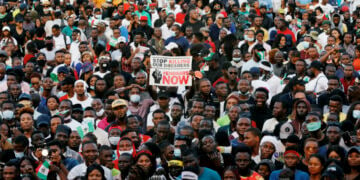The United Nations Children’s Fund (UNICEF) has released a staggering figure that should send shockwaves not only through Nigeria but also resonate globally.
According to its recent report, Nigeria has suffered an enormous economic loss of $100 billion over a decade due to the ongoing conflict in its North-East region.
Without doubt, this revelation and its impact on the nation, demands the attention, reflection, and concerted efforts of all to address the underlying issues that perpetuate such devastation.
The decade-long conflict, which has raged from 2008 to the time of the report in 2021, has left an indelible mark on Nigeria’s socio-economic landscape.
Also, according to reports, more than 35,000 people have been killed since 2009 when Boko Haram launched its insurgency aimed at overthrowing Nigeria’s secular government and establishing an Islamic state.
The UN agency’s report explained how the direct consequences of conflict, ranging from loss of life and injuries to displacement, loss of livelihoods, and damage to infrastructure, cast long shadows on the nation’s economic growth.
These impacts have transformed into a substantial economic toll, one that must not be overlooked.
The report’s quantitative estimate of the economic cost of violence and grave violations offers a stark realization of the development opportunities forfeited in the face of conflict.
The $100 billion figure symbolises not merely a fiscal loss but a tragic missed chance for progress and prosperity. It indicates the path not taken, the businesses not created, and the lives not uplifted due to the turmoil.
The ramifications of this conflict are not confined to the North-Eastern region where it is most acutely felt. The entire nation bears the brunt of this crisis, as the report highlights.
Nigeria’s economic significance in the region means that its slower growth due to conflict has broader regional implications.
In a world where nations are interconnected in myriad ways, Nigeria’s challenges ripple outward, affecting neighboring countries and regional stability.
UNICEF’s Representative in Nigeria, Cristian Munduate, rightly emphasized that even if the conflict diminishes in the coming years, its scars on the economy will persist for some time.
In our view, to address this dire situation, it is imperative that Nigeria takes a multi-faceted approach. First and foremost, a concerted effort to bring peace and stability to the North-East region is paramount. Conflict resolution, post-conflict reconstruction, and reconciliation must be prioritised to heal the wounds inflicted over the past decade.
Furthermore, investments in education and healthcare, particularly for the children who have been disproportionately affected by this crisis, are of utmost importance.
These investments are not just a moral obligation but also a strategic move to secure Nigeria’s future. A well-educated and healthy population is the bedrock of any nation’s prosperity.
Economic diversification is another avenue that Nigeria must explore. Overreliance on a single sector, such as oil, has left the nation vulnerable to economic shocks. A diversified economy is more resilient in the face of crises and offers opportunities for growth, job creation, and poverty reduction.
In addition to domestic efforts, international collaboration is vital. Nigeria should engage with regional and international partners to seek support in resolving the conflict and mitigating its consequences. The global community has a shared interest in helping Nigeria overcome this challenge, as regional stability is intertwined with global security.
In our opinion, the report’s findings underscore the need for preventive measures to avert future conflicts. Investing in conflict prevention and early warning systems can save not only lives but also substantial economic resources. Nigeria, like many nations, must recognize that preventing conflicts is far more cost-effective than dealing with their aftermath.
Consequently,the revelation that Nigeria has lost $100 billion to the North-East conflict should serve as a wake-up call for the nation and the world. It is a stark reminder of the devastating consequences of conflict, not only in terms of human suffering but also in economic terms. Nigeria must take proactive measures to end the insurgency in the north east, invest in its people, diversify its economy, and seek international cooperation to secure a brighter future.
This is a pivotal moment for Nigeria, one that requires visionary leadership, determination, and collaboration. The path ahead may be challenging, but the potential rewards—stability, prosperity, and a better future for all—make it a journey worth taking.





